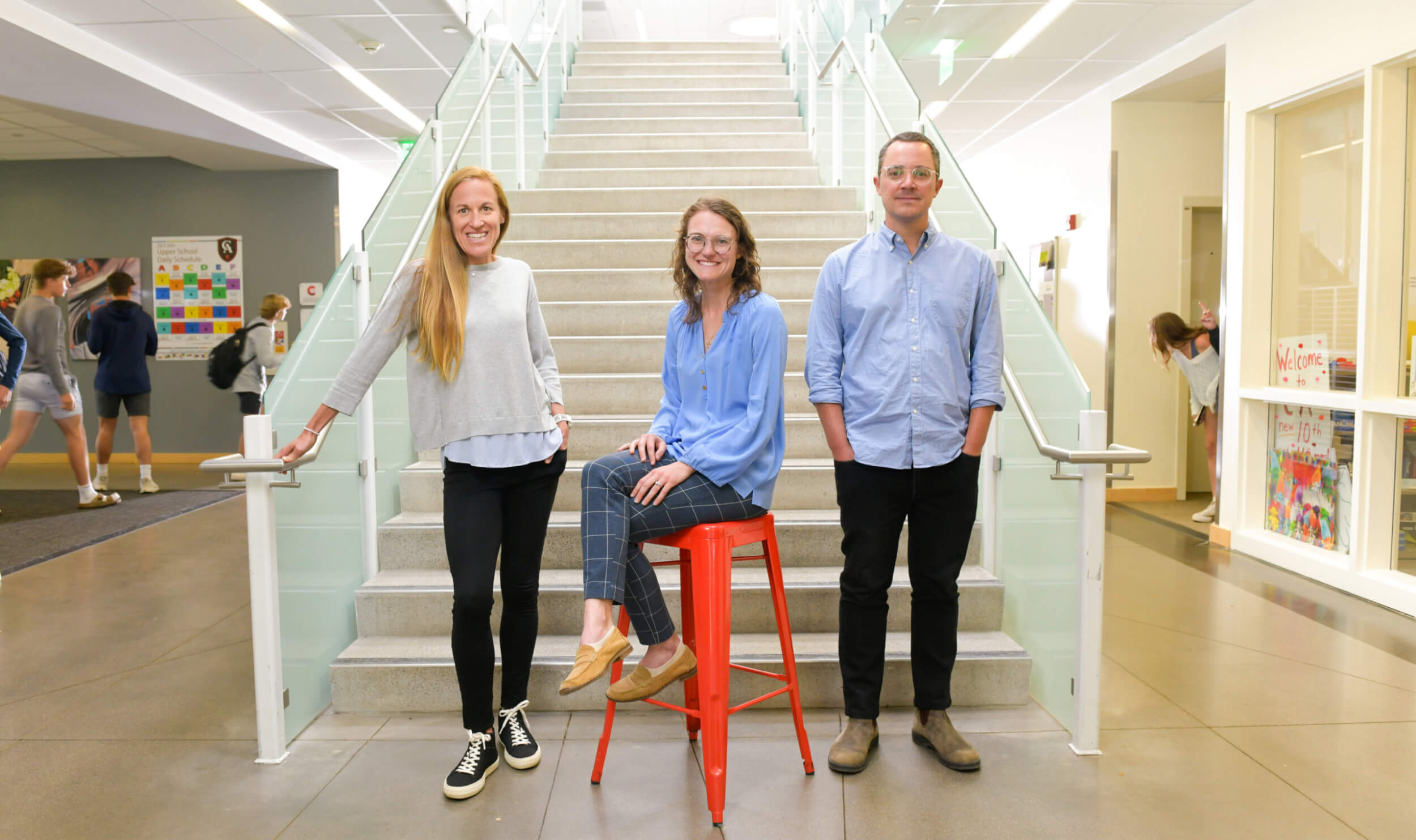In Colorado Academy’s Advanced Studies and Research (ASR) classes offered in the Upper School, a few things stand out: the many voices sharing ideas and observations, the willingness to question conventional wisdom, the fingers flipping (or laptop-scrolling) to relevant passages in primary and secondary sources, and the laughter—plenty of it.
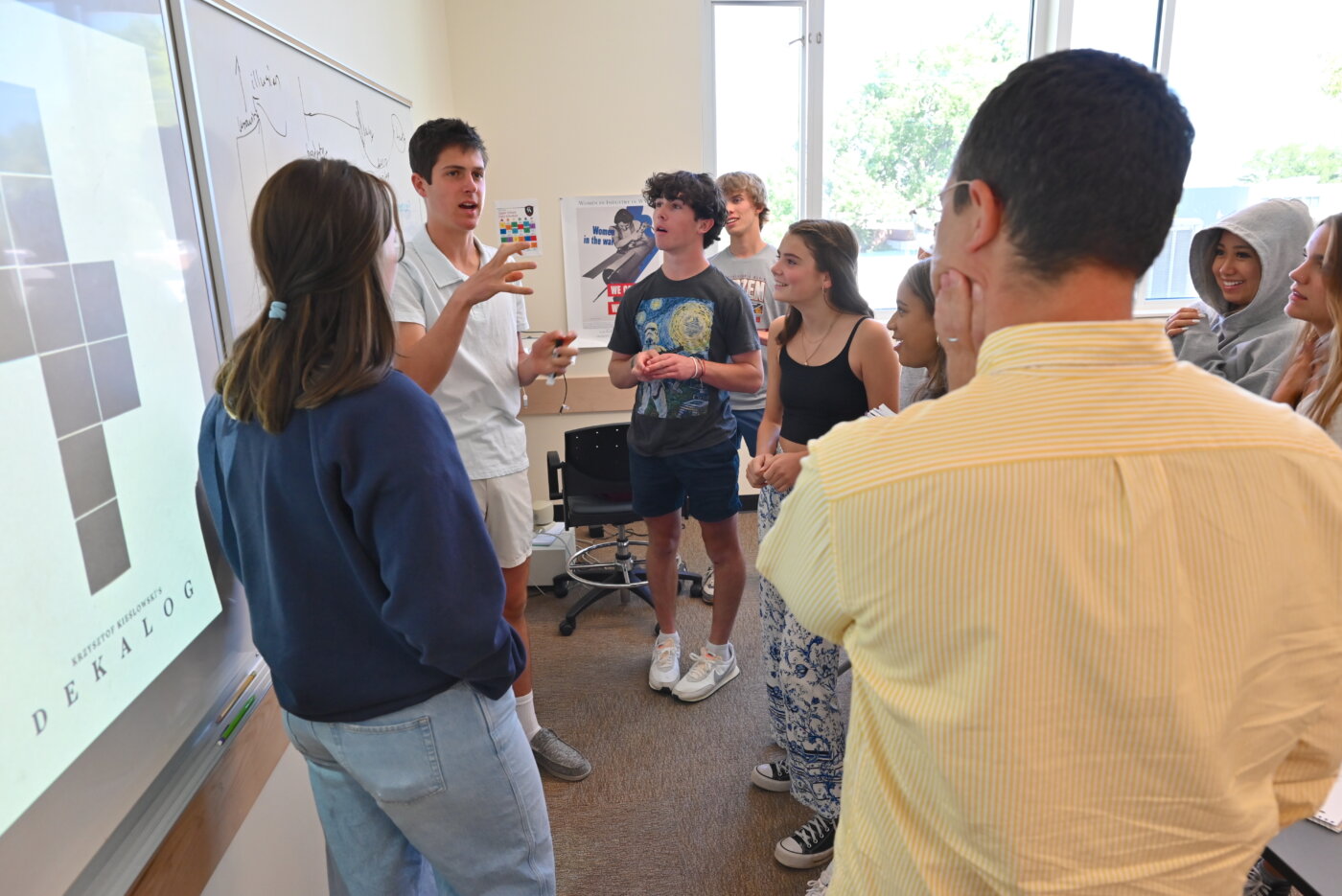
As characterized by Senior Instructor and English Department Chair Ross Holland, whose course Philosophy and Literature is one of the first to carry the ASR designation, this is the “collective energy” that naturally sparks into life when passionate, engaged thinkers are offered the time, the freedom, and the guidance to delve into the biggest questions and discover the joy of true intellectual exploration.
“One way to think about ASR,” Holland says, “is that we’re coming together to do something really hard, and trying to have fun while doing it.”
Beginning in the fall of 2023, CA’s English and Social Studies Departments replaced four Advanced Placement (AP) classes with CA’s own ASR program—courses designed to give students more agency and the space and encouragement to rigorously pursue multidisciplinary questions that connect to the broader world. Visual and Performing Arts and Computer Science Departments also began adding ASR courses.
These new offerings are weighted and presented to colleges alongside AP courses as the most rigorous in each discipline, yet, explains Director of College Counseling and Upper School Strategic Initiatives Sonia Arora ’01, ASR will help students differentiate themselves in ways that AP currently limits. “We believe firmly that moving away from AP will make our program more distinctive to colleges and our students’ achievements more noteworthy,” she asserts.
CA is far from alone in reevaluating the role of AP in the curriculum: More than 80 other leading independent schools have made the choice to develop their own college-level advanced courses in the last 15 years, eliminating AP, and some have never offered AP. By participating in this widespread movement, CA makes its values as a school clear: Curiosity, the pursuit of big ideas, and passionate engagement with the world are essential if education is to be a transformative force for good.
Head of School Dr. Mike Davis says simply, “The kind of programmatic evolution that ASR represents is at the heart of CA’s mission.”
“We just pivot”
Witnessing the excitement that suffuses the classrooms where CA’s dozen ASR courses for 2023-2024 are taught leaves little room to argue with that assessment. Students’ passion for the exchange of ideas is palpable.
Of her course Superpowers: China, Russia, and the United States in the Modern World, Senior Instructor and Social Studies Department Chair Liz Sarles says, “My favorite thing about ASR so far is its organic nature. Whereas the AP curriculum demands that you move through the material toward the test in a linear, proscribed way—or else you get ‘off track’—in my class there’s never that pressure. We’re never behind: We just pivot. Eagerly sharing their interests and observations about how the content we’re covering connects to the world, the students move the trajectory of the course as we go deeper into areas they want to investigate.”
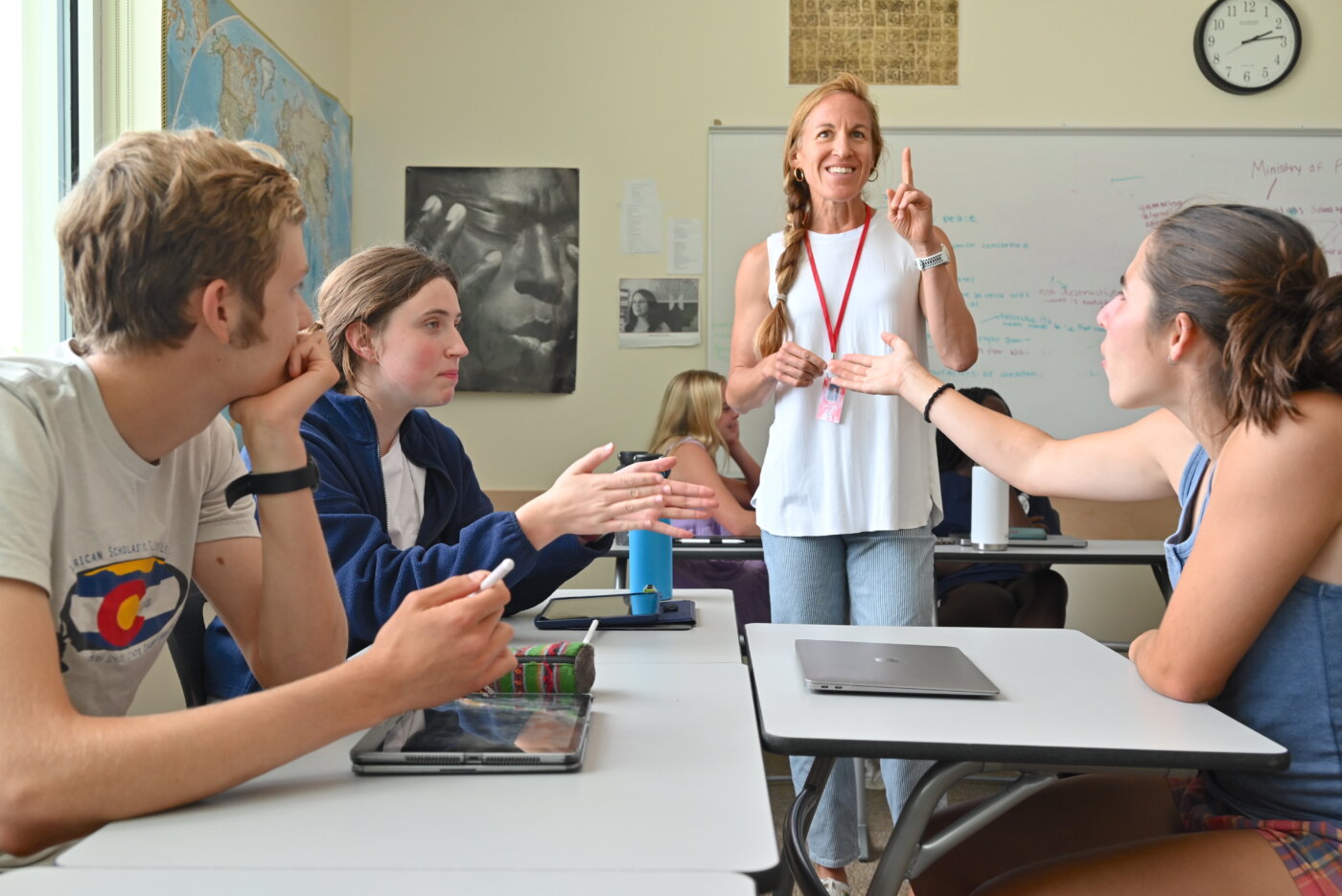
The Juniors and Seniors taking Superpowers look at great power development and rivalry through an interdisciplinary lens, incorporating historical periods such as the Cold War, global competition around technologies such as semiconductors, multiple frameworks of international relations, and literary approaches to geopolitical questions in their discussions and debates.
But ripped-from-the-headlines news and other current events are fair game, too, as the nations in question make moves that bring all those forces into the present day—and into the classroom.
Students examine the history and geopolitical motivations behind the latest developments in the war in Ukraine. They unpack the controversy around recognizing Taiwan’s status as an independent country—even dissecting a Wall Street Journal editorial by entrepreneur and Republican presidential candidate Vivek Ramaswamy calling for the U.S. to militarily defend Taiwan. And they look back on the attacks of September 11, 2001, by attending a National Security Forum hosted by Denver’s Counterterrorism Education Learning Lab and featuring former Secretary of State Condoleeza Rice, CNN National Security Analyst Peter Bergen, and Admiral James Stavridis, 16th NATO Supreme Allied Commander in Europe.
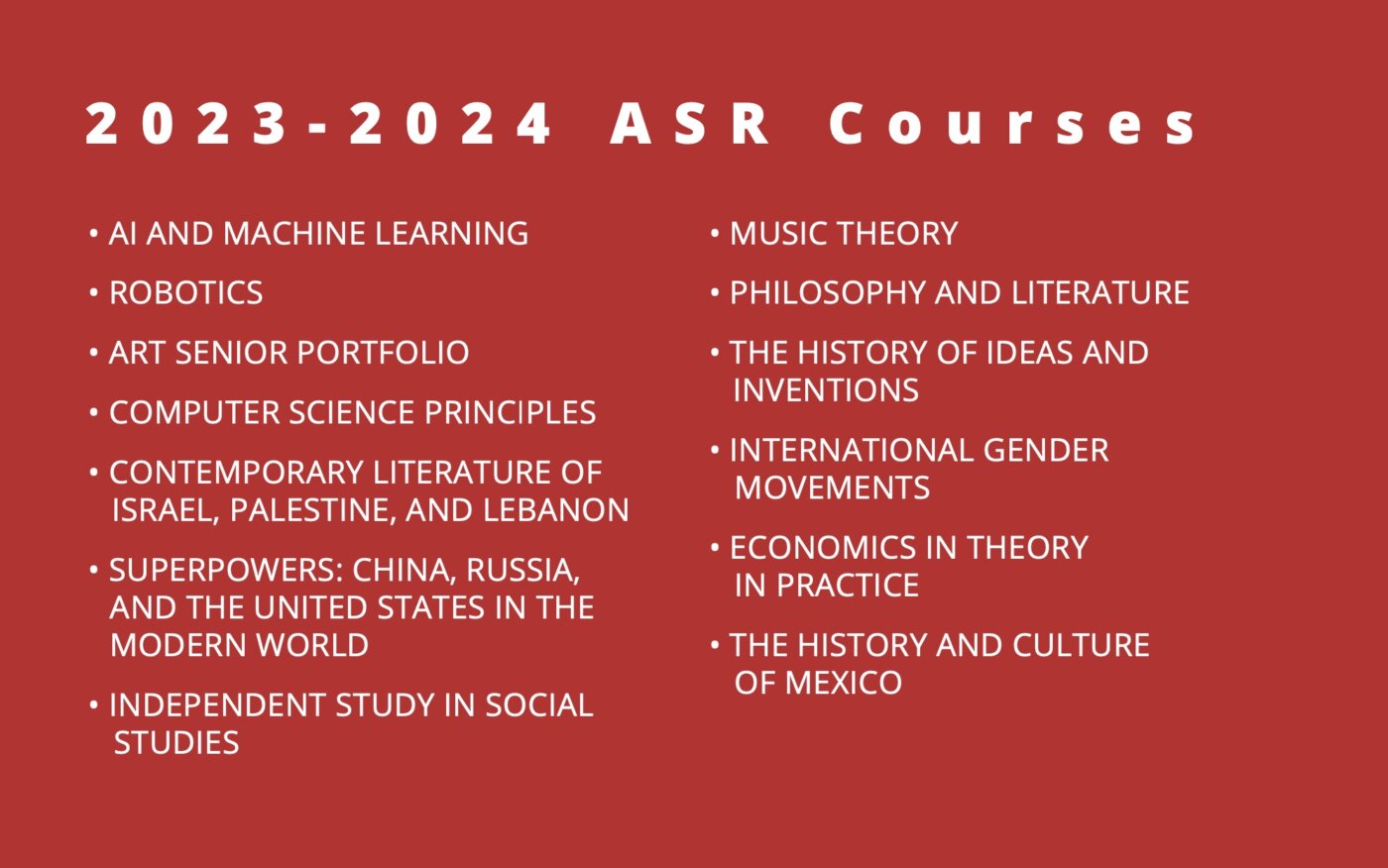
Explains Sarles, “There are plenty of schools that dropped AP courses without providing anything in their place. But the fact that ASR at CA is filling that opening with something that is so thoughtful and helpful and exciting and relevant—I think it just showcases that we truly are preparing kids to approach contemporary issues by providing them with what they’re going to need going forward in their education and their lives.”
“Have we lost something by moving away from AP?” Sarles challenges. “Absolutely not. All I see are gains.”
Experimenting with ideas
In Holland’s class, the ASR designation means that students dive deeply, at a college level, into major philosophical constructs—epistemology, ontology, and ethics—through close consideration of challenging texts, films, graphic novels, and other works by creators such as George Orwell (1984), filmmaker Krzysztof Kieslowski (Dekalog), contemporary novelist Paul Auster (City of Glass), and poet Tracy Smith (Life on Mars).
“The goal of this course’s approach,” Holland says, “is not for me to take some sort of knowledge I have in my head and ‘transfer’ it into students’ heads. It’s to create the conditions and the context in which we can experiment with ideas. None of us in the room, including me, is going to definitively answer the questions we’re considering—How do I know what I know? What makes me who I am? Instead, I’m facilitating a classroom dynamic and a community that nurtures the very best kind of learning.”
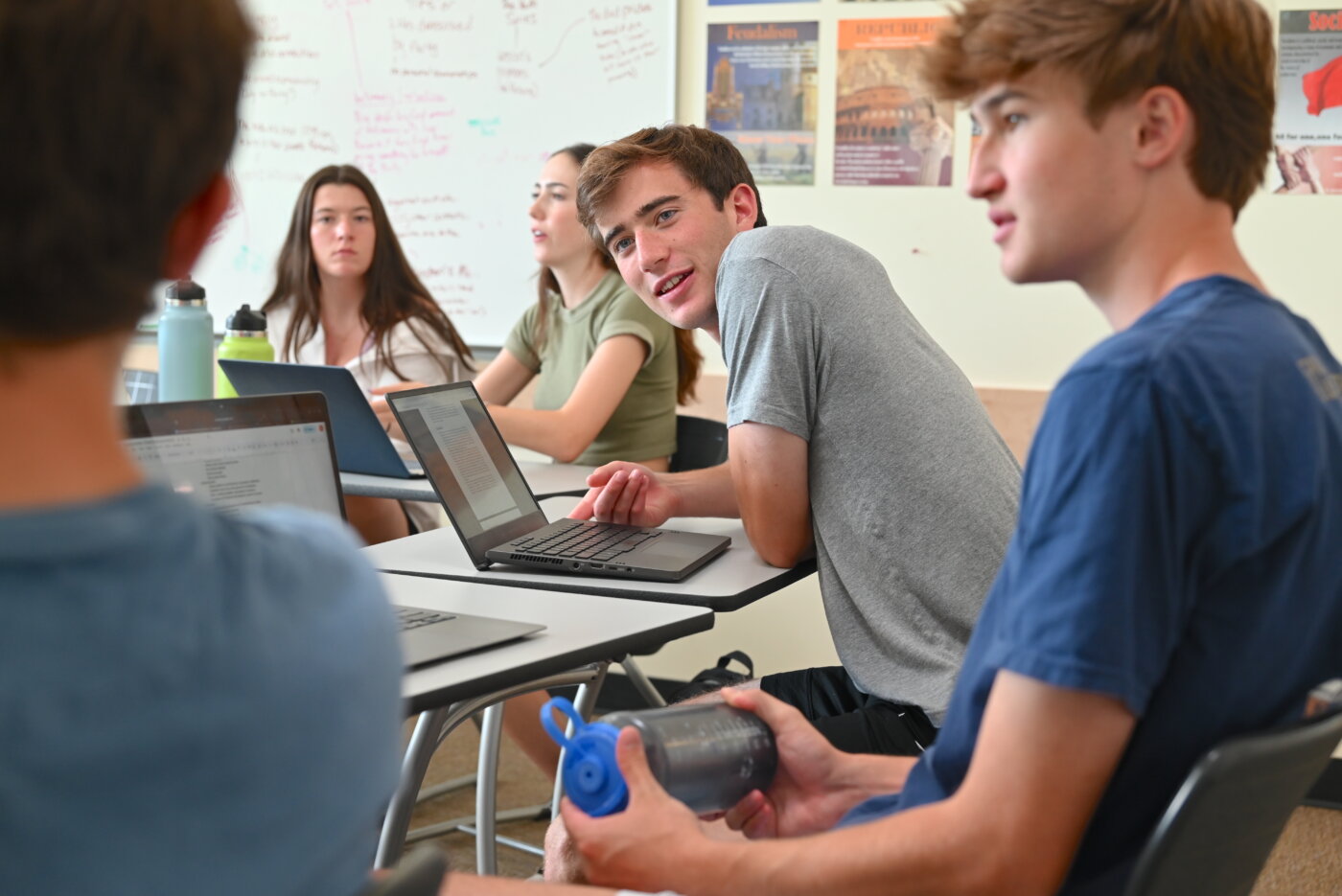
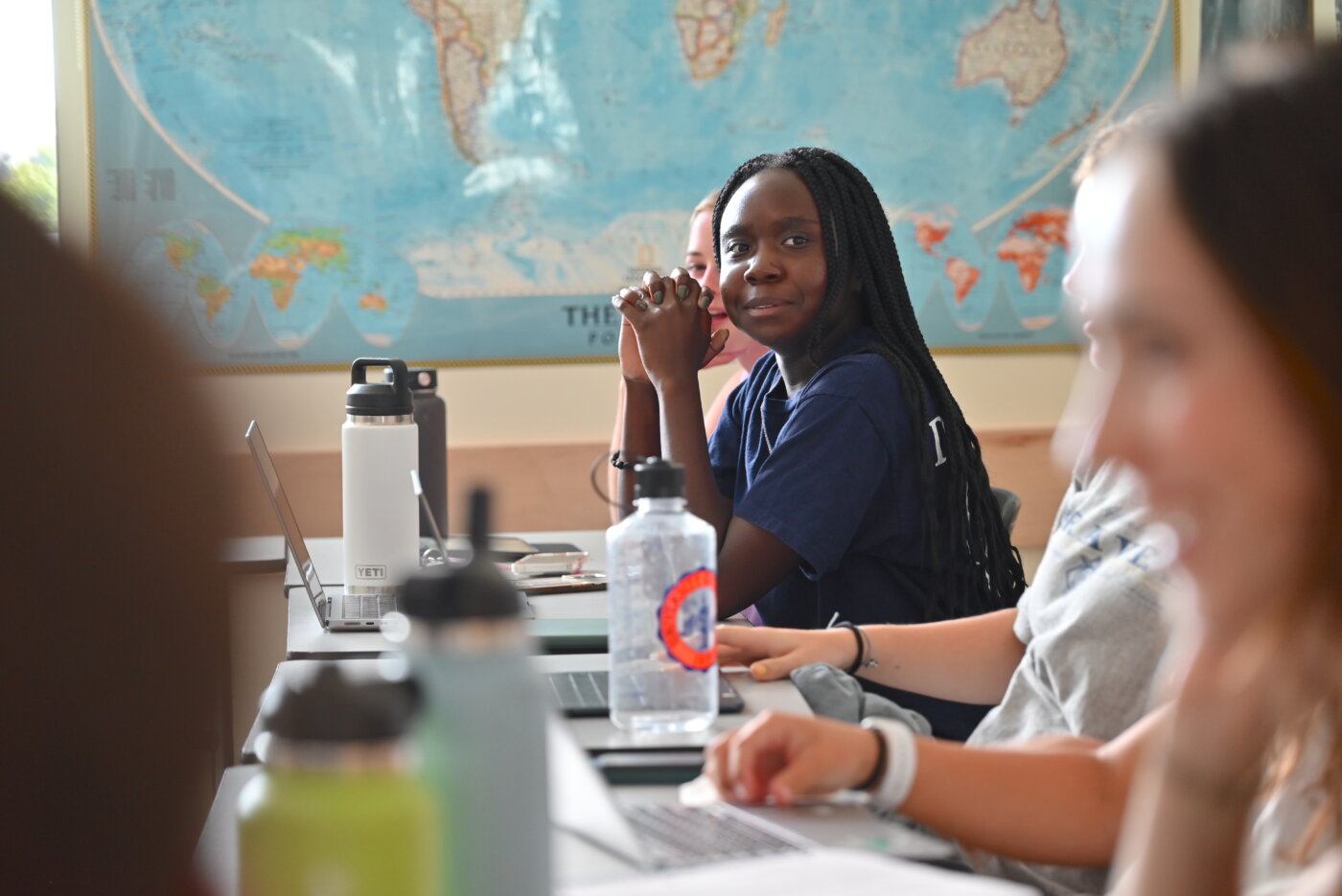
For Holland, like Sarles, the heart of ASR is loosening staid expectations around predefined outcomes and reassessing the role of teacher and school. “My ASR class should be a place for students to test out their ideas,” he elaborates. “If I come into the room thinking, ‘We must get to concept X in order for today to be successful,’ then when my students begin to truly engage with each other and explore where that takes them, I might feel a little frustration. I might miss the wonderful ideas that we did get to.”
Holland acknowledges that this way of thinking about classroom culture and its outcomes is starting to “infect” his other classes, too. “Reflecting on the high level we hope our humanities students reach as a Junior or Senior in an ASR course, we have to ask ourselves, what does that mean for our Ninth and Tenth Graders? What do we need to do to prepare them?”
That holistic view has been part of the reevaluation of AP and the implementation of ASR from the start, Holland makes clear.
“In order for us to rethink AP, you have to rethink everything. You have to rethink what are the skills and dispositions that we’re trying to foster in Ninth Grade, and even before that. ASR has really inspired a much larger conversation about teaching and learning at CA.”
The ones asking the important questions
That intellectual foment has not been confined to the humanities, where it’s often easy to see student passions driving discovery and academic rigor. In computer science and engineering design teacher and Computer Science Department Chair Katie Schneider’s ASR, Computer Science Principles, what sounds like a straightforward journey through coding and related concepts becomes an adventure into the fundamentals of computing.
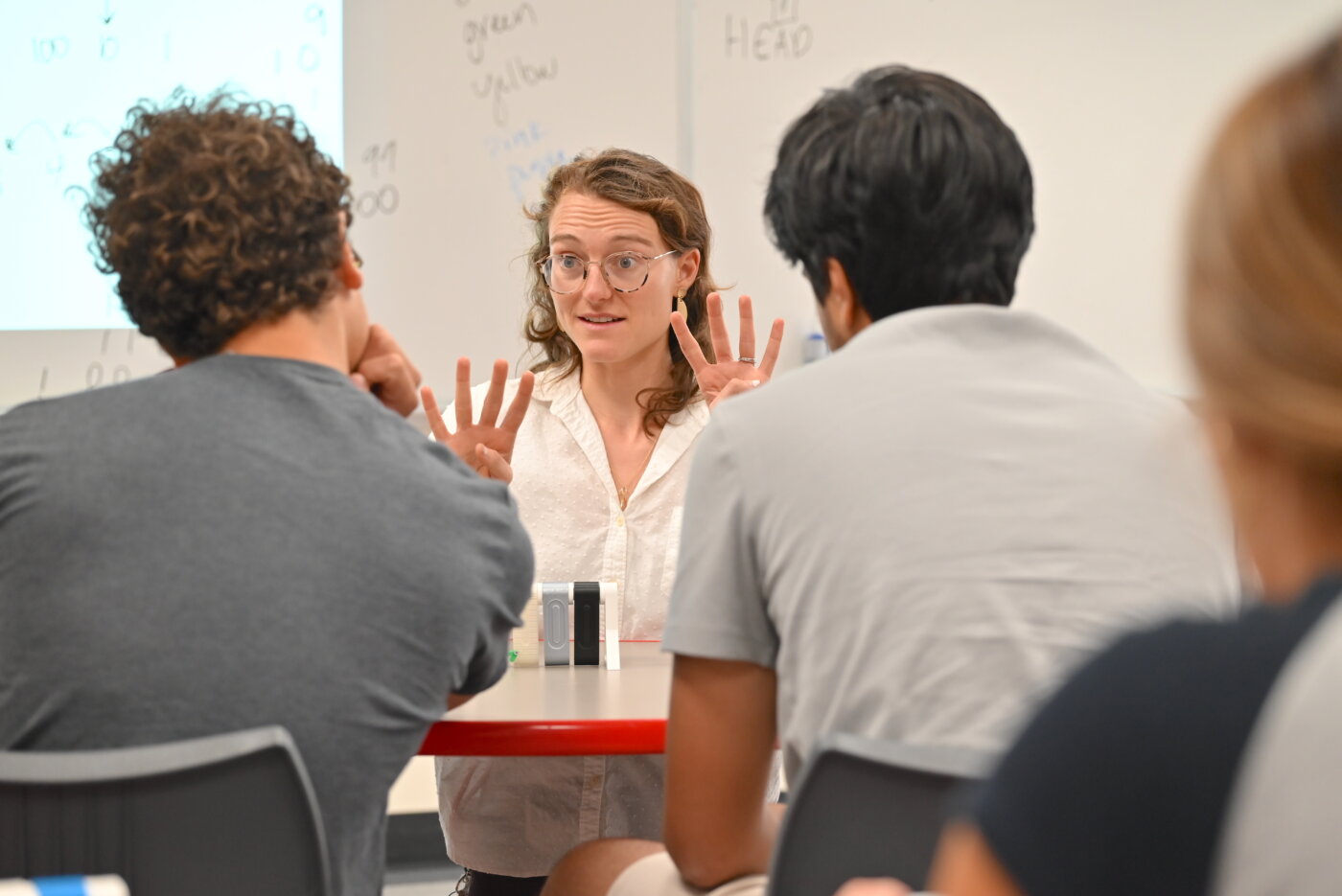
Previously, the course was, in fact, offered as an AP, with a heavy emphasis on designing and evaluating solutions through the development of algorithms and programs. But AP Computer Science Principles required students to spend a significant chunk of class time learning a “pseudo” coding language just to take the final examination, a burden that precluded in-depth exploration of other topics.
“We were learning the ways of the AP test,” Schneider explains, “rather than getting into things that we were excited about or working on projects that inspired students.”
Now, not only does the course make space for students to design and code their own final programs—everything from graphics-intensive games to practical, productivity-enhancing apps—but it also allows for extended sessions looking at what Schneider calls the “nitty-gritty” of computing.
This generation of students, she observes, is so fully immersed in computing technologies throughout their daily lives, from their phones to their laptops, smart watches, and TVs, that it’s more important than ever for them to stop to wonder at what makes it all possible. “Every single day, my students are sending texts, images, and videos on their devices. But in this course, we’re looking at how, beneath that abstraction layer of the phone screen or the computer interface, the binary number system is the foundation of everything they take for granted.”
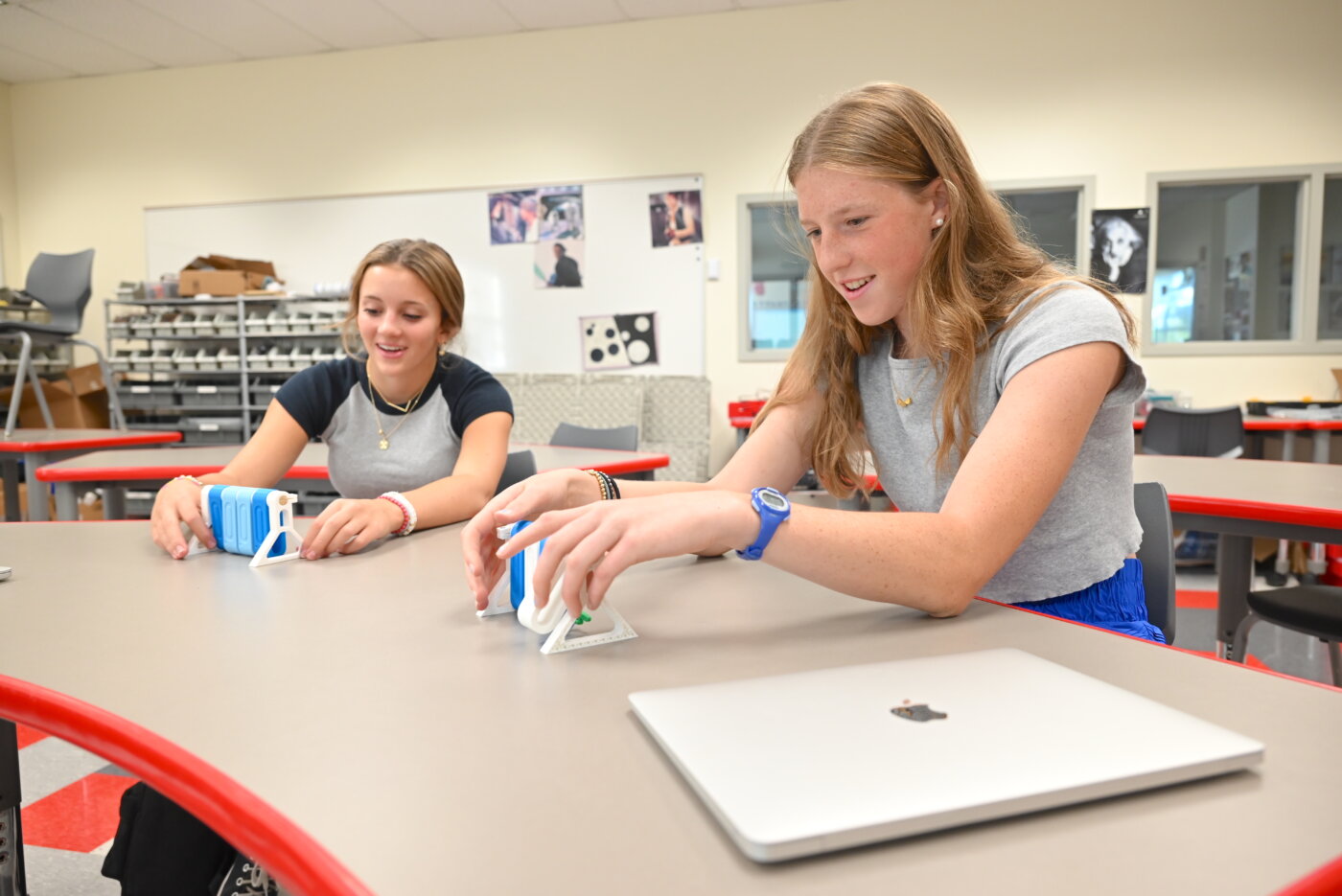
Thinking about how binary 1s and 0s can represent decimal numbers, the alphabet, shapes, colors, and ultimately sounds and moving images leads students to considering pressing contemporary issues, such as online security breaches and the rise of artificial intelligence (AI).
“In the very near future, if not right now, the non-coding concepts we’re exploring—for example, how internet data travels as binary information, or how the large language models underlying AI process and reflect the digital world and its biases—are going to be critically important for these young people to understand,” Schneider argues.
Most of her students won’t be, say, working on coding an AI; but they will most likely be using it to do their jobs, and possibly to do amazing things. As Schneider tells her students, “Whatever field you end up in, you want to be the people who are asking the important questions about what data we’re using, is it the right data, and are we representing all of the people who we want to represent within this data? That’s going to become the most important work they can do in the future.”
A world of discoveries
As understanding the binary number system segues into discussion of bias and equity in computing, it becomes clear that in Computer Science Principles, just as in CA’s other ASR courses, no field of study is really separate from any other.
And that, the teachers will tell you, is very much the point.
Holland notes that central texts his students study, such as Orwell’s 1984, deliberately have a place in the reading list for a course like Sarles’ Superpowers. Similarly, knowledge of computer science and the history of semiconductor development can inform discussion of the global “chip wars.” And the philosophy of Plato, including his musings about the nature of justice or the contrast between perception and reality, surely comes into play as students tackle the pronouncements of a Ramaswamy or a Putin.
“All subjects are everywhere,” is the way Sarles puts it. “Social studies doesn’t exist in a vacuum. Literature doesn’t exist in a vacuum. The onus is on us as educators to light the way to genuine academic freedom and intellectual discourse that embrace ideas and opinions from across the political spectrum and across disciplines. Interdisciplinary learning is the deepest and most relevant learning we challenge our students to undertake.”
The role of ASR, continues Sarles, is to “give our students access to a world of stories and discoveries as they build their own.”
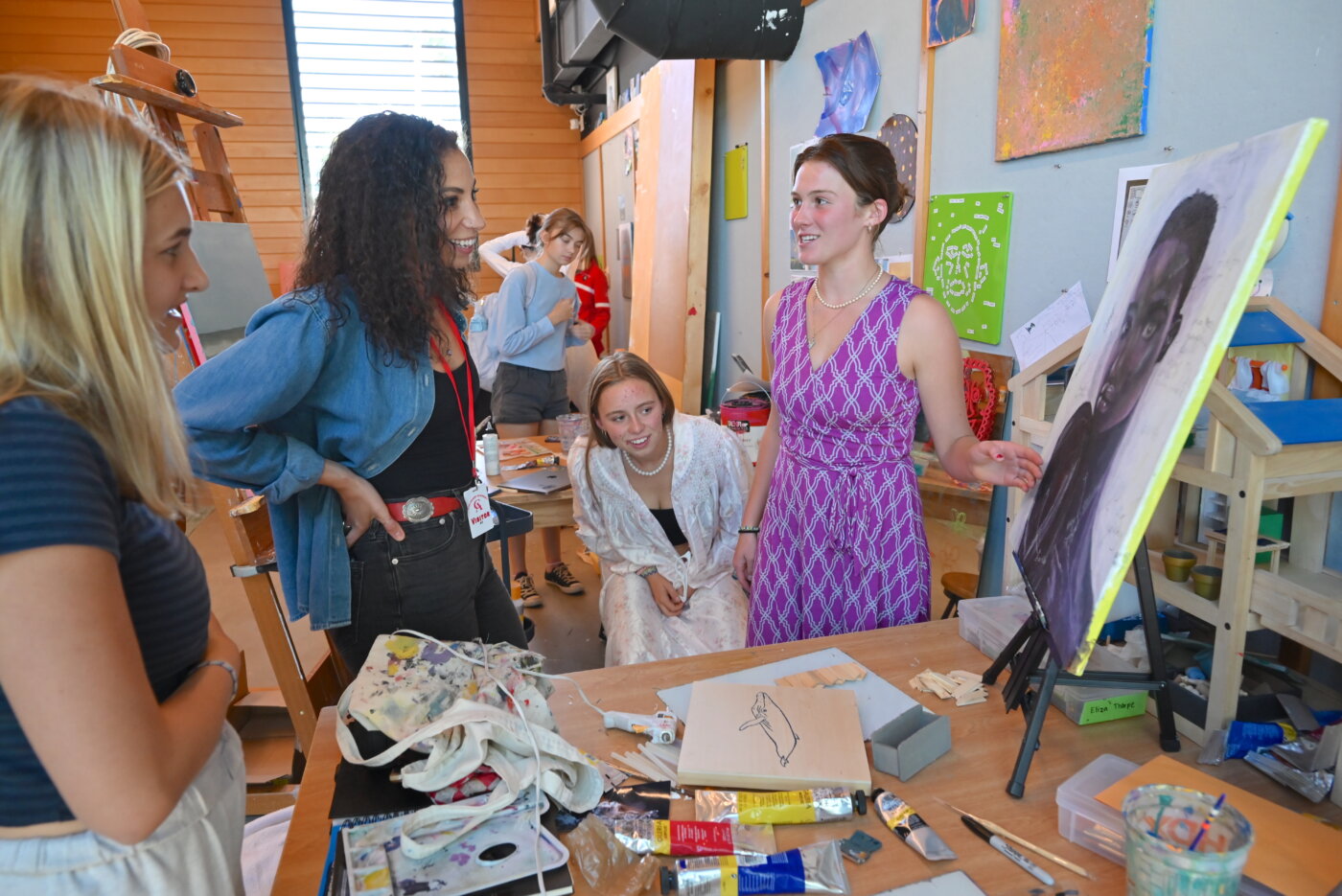
All ASR courses culminate with significant final projects, which represent deep and original scholarship and creativity and celebrate high-level thinking. Humanities students travel to the University of Denver’s main library in the Anderson Academic Commons to conduct research toward a college-thesis-like paper; those in the arts mount a formal gallery show; and those in computer science develop a robust application.
But whatever the tangible outcome, the intangible and arguably more important result is a new vision of teaching and learning in which students master the art of sustained intellectual engagement and discover its joy and excitement.
